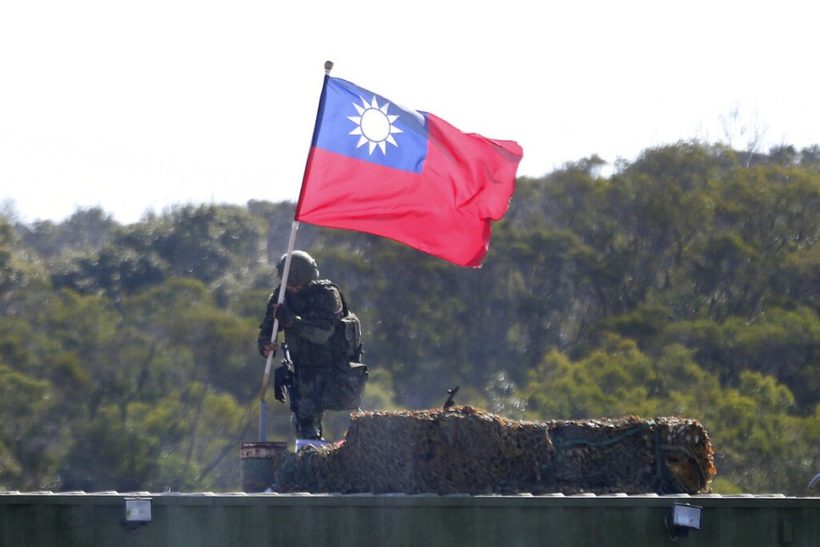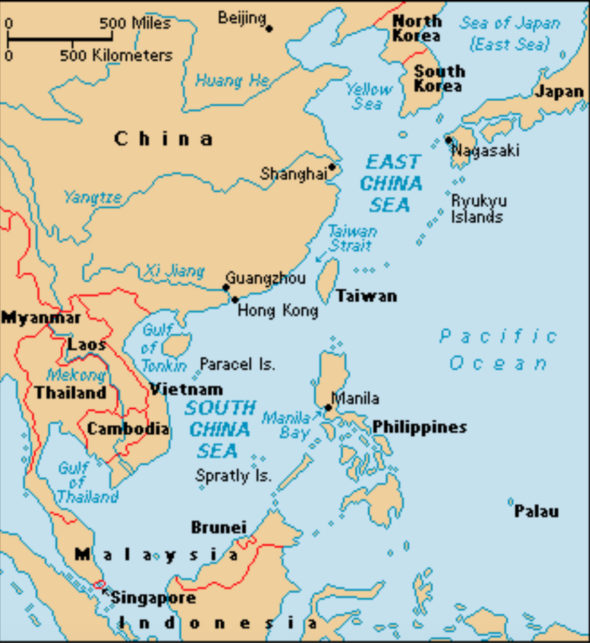
A soldier holds a Taiwan national flag during a military exercise, Jan. 19, 2021, in northern Taiwan.
redo Jump to...
print Print...
(BBC News) — China has warned Taiwan that any attempt to seek independence “means war.”
The warning comes days after China stepped up its military activities and flew warplanes near the island.
It also comes after President Joe Biden, following along with the Trump admistration’s position on Taiwan, reaffirmed U.S. commitment to the democratic island nation, and set out his stance in Asia.
The US has called China’s latest warning “unfortunate,” adding that tensions did not need to lead to “anything like confrontation.”
China claims democratic Taiwan is a breakaway province, but Taiwan says it is a sovereign state, with its own constitution, military, and elected leaders.
Analysts say the Communist rulers of China are becoming increasingly angered that Taiwan’s government is moving the island towards a formal declaration of independence and it wants to warn President Tsai Ing-wen against taking steps in that direction.
President Tsai, however, has repeatedly said that Taiwan is already an independent state, making any formal declaration unnecessary.
On Thursday, Chinese defense ministry spokesman Wu Qian defended the recent military activities near Taiwan, saying they were “necessary actions to address the current security situation in the Taiwan Strait and to safeguard national sovereignty and security”.
“They are a solemn response to external interference and provocations by ‘Taiwan independence’ forces,” he added.
“We warn those ‘Taiwan independence’ elements – those who play with fire will burn themselves, and Taiwan independence means war.”
The Biden administration responded later on Thursday.
“We find that comment unfortunate,” Pentagon press secretary John Kirby told reporters, in the first statement by the new administration on China-Taiwan relations.
Mr. Kirby added that the Pentagon “sees no reason why tensions over Taiwan need to lead to anything like confrontation.”
It is hoped that the new Biden administration will continue Trump’s policies of maintaining pressure on China over a wide range of issues including human rights, trade disputes, Hong Kong and Taiwan, amid the deteriorating relationship between the two powers.
Taiwan’s Mainland Affairs Council, meanwhile, said China should “not underestimate” the island’s determination to defend its sovereignty and uphold freedom and democracy….
Published by BBC News on Feb. 1, 2021. Reprinted here for educational purposes only. May not be reproduced on other websites without permission.
Questions
NOTE: Before answering the following questions, read the info under “Background” and watch the videos under “Resources” below.
1. List the who, what, where and when of the news report.
2. How did Taiwanese President Tsai Ing-wen respond to Beijing’s opposition to a possible declaration of independence?
3. a) How did China’s defense ministry spokesman Wu Qian defend China’s recent military activities near Taiwan?
b) What warning did he issue?
4. How did the Biden administration respond to China’s latest threat to Taiwan?
5. What response did Taiwan’s Mainland Affairs Council have to China’s threat?
6. Prior to Donald Trump, previous presidents were afraid of making the Chinese communist government angry and therefore avoided selling Taiwan any large arms which would have helped the country defend itself.
(They also believed in the failed policy that if the world allowed China admittance to the World Trade Organization (WTO), it would improve China’s economy and naturally make the government more democratic. Instead, as its economy has grown, China has become more authoritarian and controlling, especially under President-for-life Xi Jin Ping.)
a) President Trump did not act based on what China’s reaction would be, but did what was right for our democratic allies. Do you think President Biden holds the same belief? Should he take the same approach to defending Taiwan? – or should he take a softer tone with actions that appease the Communist regime?
b) What is the best policy toward Taiwan and China for the U.S.? What effect, if any, would allowing Taiwan to fall to China have on America and the world in the future? Explain your answers.
Background
U.S. Relationship with Taiwan:
The U.S. has full diplomatic ties with China but is also committed, under the Taiwan Relations Act of 1979, to an unofficial relationship with Taiwan and to help the island defend itself against any unprovoked aggression. Congress intended for the Taiwan Relations Act to preserve a relationship with a traditional ally of the United States after President Jimmy Carter decided to transfer diplomatic recognition from Taipei to Beijing.
The Taiwan-China fight that’s driving all this
The dispute between China and Taiwan goes back to 1949 and the end of the Chinese Civil War, when the defeated Nationalists fled to the island of Taiwan, leaving the communists in power in mainland China. The two territories have been governed separately ever since, with both governments claiming to be the legitimate representative of “One China” — that is, China and Taiwan.
Decades of outright hostility eased somewhat in 1992, when they worked out a deal that basically amounted to “let’s agree to disagree.” Known as the 1992 Consensus, the agreement allowed both governments to claim sovereignty over both mainland China and Taiwan, without recognizing the other’s legitimacy.
This allowed them to set aside their argument and establish economic ties, which would be hugely beneficial to both parties. And it (mostly) worked: China is now Taiwan’s largest trading partner.
But, of course, it left the fundamental political dispute unresolved, with the potential for a resumption of hostility always just below the surface. And it remains a hugely sensitive issue for both sides.
Most countries, including the US, only have formal diplomatic relations with mainland China and don’t officially recognize the government in Taiwan. (from an April 2016 Vox article)
Update:
- The new non-binding Trump signed describes Taiwan as” a beacon of democracy ” in Asia and states that “Taiwan’s democratic achievements inspire many countries and the region.”
- Beijing had recently cut official communications with Taipei because current President Tsai Ing-wen refuses to recognize the democratic island as part of “one China.”
Read “The Taiwan Travel Act in Context” from The Diplomat (a current-affairs magazine for the Asia-Pacific region).
Daily “Answers” emails are provided for Daily News Articles, Tuesday’s World Events and Friday’s News Quiz.




